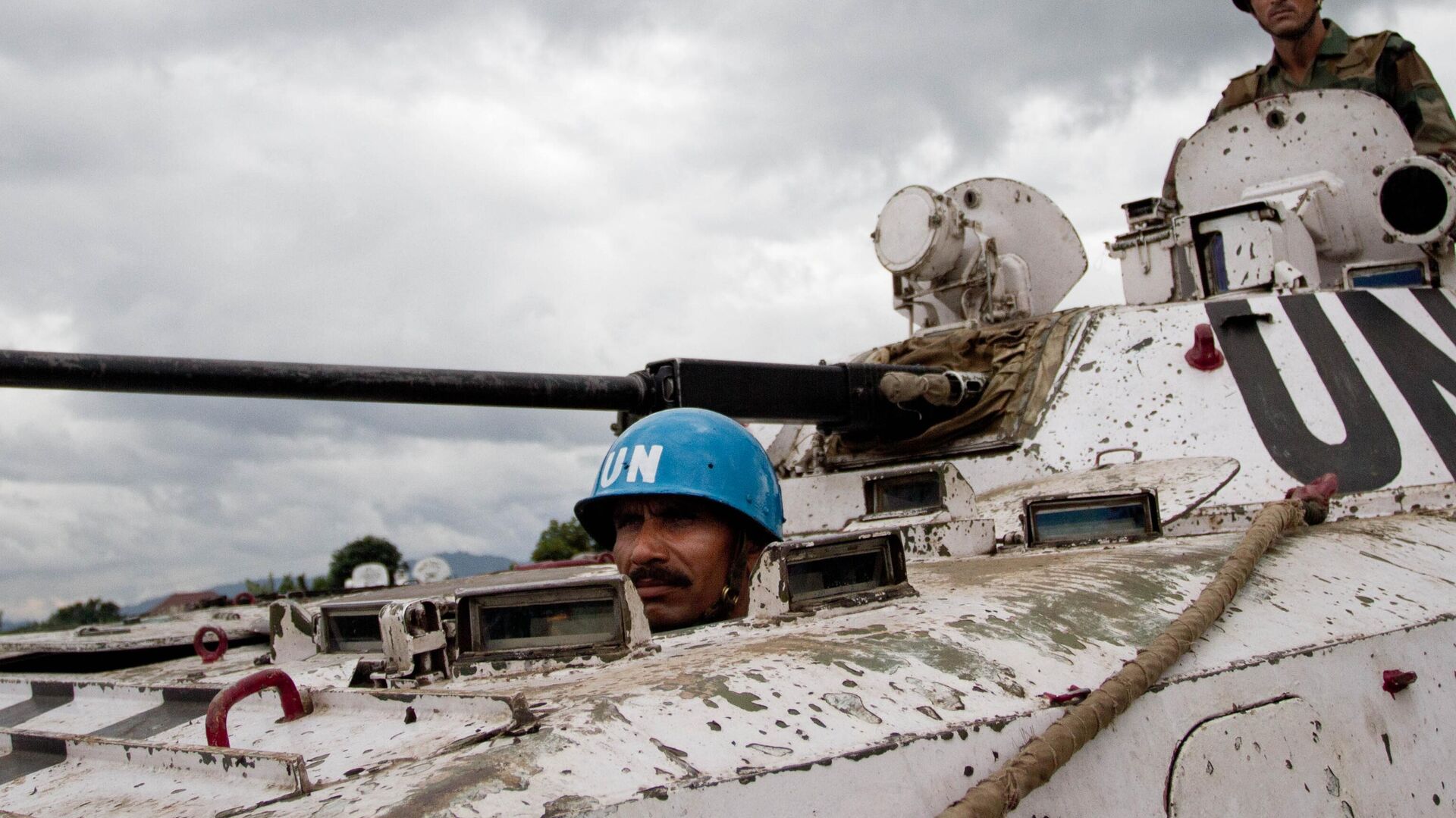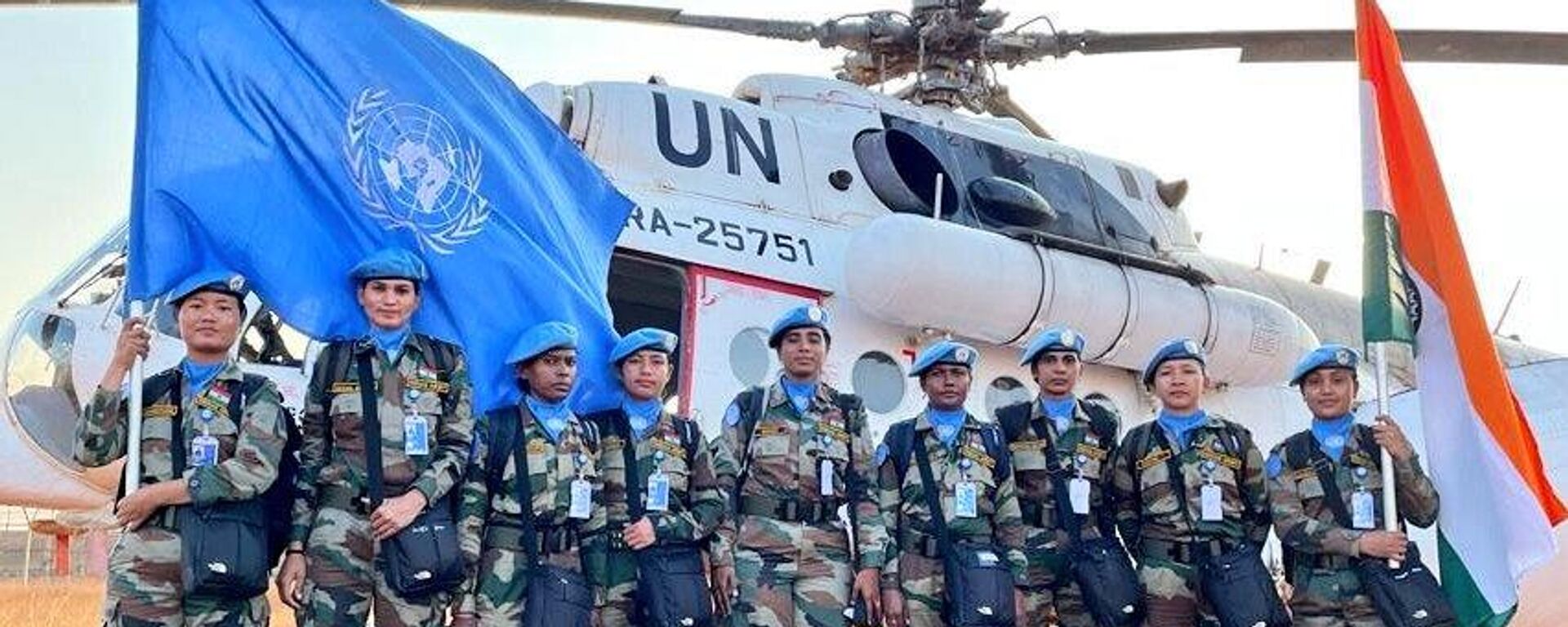https://sputniknews.in/20240415/after-indian-troop-withdrawal-rebel-factions-heighten-tensions-in-congo-monusco-7139185.html
After Indian Troop Withdrawal, Rebel Factions Heighten Tensions in Congo: MONUSCO
After Indian Troop Withdrawal, Rebel Factions Heighten Tensions in Congo: MONUSCO
Sputnik India
The Rebel faction M23 has made advances in eastern DR Congo following the withdrawal of Indian peacekeeping troops.
2024-04-15T20:09+0530
2024-04-15T20:09+0530
2024-04-15T21:12+0530
india
pakistan
the united nations (un)
un security council (unsc)
government of india
ministry of external affairs (mea)
ministry of defence (mod)
un peacekeepers
peace settlement
peace talks
https://cdn1.img.sputniknews.in/img/07e8/03/1c/6969461_0:161:3071:1888_1920x0_80_0_0_908db7643019ece4ad11bb2fd1ee53a0.jpg
The Rebel faction M23 has made advances in eastern DR Congo following the withdrawal of Indian peacekeeping troops.Ndeye Khady Lo, spokeswoman for the United Nations Organisation Stabilization Mission in the Democratic Republic of Congo (MONUSCO), explained the situation to Sputnik India.During Operation Springbok, "MONUSCO maintained defensive blocking positions to prevent M23 from entering the city along all northern and western axes entering Goma” Ndeye noted.But the joint Operation Springbok initiated by MONUSCO and Congolese forces has acted as a deterrent against further advancement towards Goma.Sake, situated approximately 25 kilometres (15 miles) from Goma, the principal city in North Kivu province, has seen its population swell to two million as refugees seek refuge from the encroachment of the M23 rebel group.The 15,000 UN troops stationed in DR Congo began departing in February at the request of the Kinshasa government, which views them as ineffective. The withdrawal is expected to conclude by the end of the year.Escalating Violence in Eastern DRC: Impact Following Withdrawal of MONUSCO's Indian PeacekeepersThousands of people fled the area to seek safety as violence escalated between the Congolese army and the M23 armed group in the eastern Democratic Republic of the Congo in February 2024.Guerrillas have reportedly encircled the strategically important town of Sake, a major step toward their potential march on Goma, the capital of North Kivu province. Seizing control of Sake poses logistical challenges for the Congolese army.Ndeye declined to provide additional information about M23's gains, insisting that "military posture and position undergo regular changes."She stressed that “MONUSCO is in contact with all stakeholders on the evolving situation including the concerned troop-contributing countries.”India is the second largest troop contributor to MONUSCO, following Pakistan, with a total of 1,888 military personnel. MONUSCO, established by UN Security Council Resolution 1925 on May 28, 2010, succeeded its predecessor, MONUC, and ranks among the largest UN peacekeeping missions.India's Peacekeeping Legacy: A Commitment to Global Stability and Collaboration“India's involvement in peacekeeping dates back to the 1960s, immediately after the Democratic Republic of Congo gained independence from Belgium," MONUSCO force commander retired Lieutenant General Chander Prakash Wadhwa told Sputnik India. "This association with peacekeeping, established early on, stems from India's commitment to the UN Charter signed in San Francisco. While our intent has always been to contribute to global peace and security, it would be inaccurate to suggest that we seek direct benefits from our engagement with the DRC.” As of September 2022, India had participated in 49 Peacekeeping missions, contributing over 200,000 troops and a substantial number of police officers. Sadly, over 160 Indian peacekeepers have lost their lives while serving under the UN banner.India advocates for robust peacekeeping efforts, according to the general, “but also stresses the importance of holistic approaches that encompass peacebuilding activities. India stands ready to contribute to peacebuilding initiatives by deploying more civilians and engaging in constructive peacebuilding endeavours.”
https://sputniknews.in/20230117/un-peacekeeping-chief-praises-indias-women-platoon-in-abyei-525375.html
india
pakistan
africa
north africa
south africa
Sputnik India
feedback.hindi@sputniknews.com
+74956456601
MIA „Rossiya Segodnya“
2024
Swapna Nair
https://cdn1.img.sputniknews.in/img/07e7/09/12/4320104_0:0:681:681_100x100_80_0_0_ca8a7d4d582609272840ffdd1cde7278.jpg
Swapna Nair
https://cdn1.img.sputniknews.in/img/07e7/09/12/4320104_0:0:681:681_100x100_80_0_0_ca8a7d4d582609272840ffdd1cde7278.jpg
News
en_IN
Sputnik India
feedback.hindi@sputniknews.com
+74956456601
MIA „Rossiya Segodnya“
Sputnik India
feedback.hindi@sputniknews.com
+74956456601
MIA „Rossiya Segodnya“
Swapna Nair
https://cdn1.img.sputniknews.in/img/07e7/09/12/4320104_0:0:681:681_100x100_80_0_0_ca8a7d4d582609272840ffdd1cde7278.jpg
rebel factions (m23), eastern dr congo, indian peacekeeping troops, ndeye khady lo, united nations organisation stabilization mission in the democratic republic of congo (monusco), monusco, congolese forces, operation springbok, goma, sake, north kivu, operation springbok, monusco, northern, western axes, goma, ndeye, operation springbok, monusco, congolese forces, north kivu province, refuge, encroachment of the m23 rebel group, indian troops from the mission, operation springbok, sake, kinshasa government, dr congo, escalating violence, eastern democratic republic of the congo, operational areas or positions occupied by m23, armed forces of the democratic republic of the congo (fardc), troop-contributing countries, united nations, peacekeeping, pakistan, united nations security council resolution 1925, united nations peacekeeping missions, 1960s, democratic republic of congo, belgium, un charter, san francisco, global peace and security, lieutenant general chander prakash wadhwa (retd), force commander for monusco 200,000 troops, un banner
rebel factions (m23), eastern dr congo, indian peacekeeping troops, ndeye khady lo, united nations organisation stabilization mission in the democratic republic of congo (monusco), monusco, congolese forces, operation springbok, goma, sake, north kivu, operation springbok, monusco, northern, western axes, goma, ndeye, operation springbok, monusco, congolese forces, north kivu province, refuge, encroachment of the m23 rebel group, indian troops from the mission, operation springbok, sake, kinshasa government, dr congo, escalating violence, eastern democratic republic of the congo, operational areas or positions occupied by m23, armed forces of the democratic republic of the congo (fardc), troop-contributing countries, united nations, peacekeeping, pakistan, united nations security council resolution 1925, united nations peacekeeping missions, 1960s, democratic republic of congo, belgium, un charter, san francisco, global peace and security, lieutenant general chander prakash wadhwa (retd), force commander for monusco 200,000 troops, un banner
After Indian Troop Withdrawal, Rebel Factions Heighten Tensions in Congo: MONUSCO
20:09 15.04.2024 (Updated: 21:12 15.04.2024) Exclusive
After Indian troops withdrew from the mission, MONUSCO spokesperson Ndeye stated that “Operation Springbok has been reinforced in February 2024 after M23’s last offensive around Sake. The operation has thus far been an effective deterrent against a further M23 advance to Goma”.
The Rebel faction M23 has made advances in eastern DR Congo following the withdrawal of Indian peacekeeping troops.
Ndeye Khady Lo, spokeswoman for the United Nations Organisation Stabilization Mission in the Democratic Republic of Congo (MONUSCO), explained the situation to Sputnik India.
Since November, MONUSCO and the Congolese forces have launched Operation Springbok to protect civilians in Goma and Sake, the two major cities of North Kivu.
During Operation Springbok, "MONUSCO maintained defensive blocking positions to prevent M23 from entering the city along all northern and western axes entering Goma” Ndeye noted.
But the joint Operation Springbok initiated by MONUSCO and Congolese forces has acted as a deterrent against further advancement towards Goma.
Sake, situated approximately 25 kilometres (15 miles) from Goma, the principal city in North Kivu province, has seen its population swell to two million as refugees seek refuge from the encroachment of the M23 rebel group.
Following the withdrawal of Indian troops from the mission, Ndeye said that “Operation Springbok has been reinforced in February 2024 after M23’s last offensive around Sake. The operation has thus far been an effective deterrent against a further M23 advance to Goma.”
The 15,000 UN troops stationed in DR Congo began departing in February at the request of the Kinshasa government, which views them as ineffective. The withdrawal is expected to conclude by the end of the year.
Escalating Violence in Eastern DRC: Impact Following Withdrawal of MONUSCO's Indian Peacekeepers
Thousands of people fled the
area to seek safety as violence escalated between the Congolese army and the M23 armed group in the eastern Democratic Republic of the Congo in February 2024.
Guerrillas have reportedly encircled the strategically important town of Sake, a major step toward their potential march on Goma, the capital of North Kivu province. Seizing control of Sake poses logistical challenges for the Congolese army.
Ndeye declined to provide additional information about M23's gains, insisting that "military posture and position undergo regular changes."
“We are in the DRC to support the Armed Forces of the Democratic Republic of the Congo (FARDC) and we are assessing the situation on the ground on a daily basis keeping in mind the need to implement the mandate and to ensure the safety of our peacekeepers,” the spokesman said.
She stressed that “MONUSCO is in contact with all stakeholders on the evolving situation including the concerned troop-contributing countries.”
“India is one of the leading troop-contributing countries and the United Nations is not only grateful for its sustained commitment to Peacekeeping but also the sacrifices made by its Peacekeepers in DRC and elsewhere under various missions over the last six decades,” Ndeye added.
India is the second largest troop contributor to MONUSCO, following Pakistan, with a total of 1,888 military personnel. MONUSCO, established by UN Security Council Resolution 1925 on May 28, 2010, succeeded its predecessor, MONUC, and ranks among the largest UN peacekeeping missions.
India's Peacekeeping Legacy: A Commitment to Global Stability and Collaboration
“India's involvement in peacekeeping dates back to the 1960s, immediately after the Democratic Republic of Congo gained independence from Belgium," MONUSCO force commander retired
Lieutenant General Chander Prakash Wadhwa told Sputnik India. "This association with peacekeeping, established early on, stems from India's commitment to the UN Charter signed in San Francisco. While our intent has always been to
contribute to global peace and security, it would be inaccurate to suggest that we seek direct benefits from our engagement with the DRC.”
But the General pointed out that “deploying peacekeepers fosters lasting connections between nations, contributing to long-term relations. Despite assertions, we haven't exploited this relationship for gain. Are we leveraging our peacekeeping contributions to secure a permanent seat on the UN Security Council? While it's a factor, it's not the sole motive. Thus far, it hasn't provided significant advantages, as the dynamics involved are far more complex than they may appear to the uninformed.”
As of September 2022, India had participated in 49 Peacekeeping missions, contributing over 200,000 troops and a substantial number of police officers. Sadly, over 160 Indian peacekeepers have lost their lives while serving under the UN banner.
The general said Indian troops' experience in peacekeeping had "taught us and others the importance of having a voice in shaping the mandate. Despite our extensive presence in the field for many years, some countries that formulate the mandate lack a deep understanding of the ground-level dynamics. It's imperative that India’s insights as a significant contributor are considered seriously in mandate formation.”
India advocates for robust peacekeeping efforts, according to the general, “but also stresses the importance of holistic approaches that encompass peacebuilding activities. India stands ready to contribute to peacebuilding initiatives by deploying more civilians and engaging in constructive peacebuilding endeavours.”



